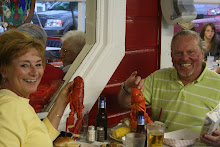4/4-4/5/2025
After sailing through the night, we awaken to find our ship
sitting at the entrance of the Corinth Canal, one of Greece’s most striking
engineering feats.
 |
| Passing Through the Canal |
2500 years in the making, the Corinth Canal links the Gulf
of Corinth in the Ionian Sea with the Saronic Gulf in the Aegean Sea. The idea
for the canal dates back to the seventh century BC but was so daunting that a
land roadway was built to haul ships overland across the isthmus. Construction
actually began with the Roman Emperor Nero in 67 AD but was abandoned after his
death.
 |
| Navigating the Corinth |
Construction resumed in 1882, and the canal was completed in 1893. Upon
its completion it made the Peloponnese peninsula an island, separating it from
the Greek mainland and providing a more direct route for shipping.
We have a quick breakfast with David and Linda and then go
to the observation deck to witness our transit of the 4-mile-long canal. The
narrow canal is only 81 feet wide. Because the Legend’s beam is 62 feet,
we are towed through the canal by a tug crew.
 |
| A Tight Squeeze! |
The canal’s depth is 26 feet and
has no locks, since it was dug at sea level. Because of the canal’s narrowness
and limited depth, it is inaccessible to the large, present-day ships and has
little commercial importance. It is used primarily by recreational boaters. We
are fascinated by our transit and consider it to be one of the more unique and
exhilarating travel experiences we have witnessed.
 |
| Amfissa Olive Grove |
Our transit completed, the
tug crew casts us free, and we sail toward our next port—Itea, Greece.
In Itea we disembark our ship and board a bus that will take
us to the ancient sacred precinct of Delphi, the seat of the Oracle of Delphi.
Along the way we near the town of Amfissa, known for its large, traditional
olive grove. As we climb a mountain, our guide notes that the olive grove in
the valley below us contains over 1.25 million olive trees and is one of the
largest olive groves in the world.
 |
| Temple of Apollo Ruins |
He also states that the trees are very old,
with 70% being more than 150 years old. The grove is protected because the path
to the Oracle of Delphi runs through it.
Arriving at Delphi, a UNESCO World Heritage Site dating back
to the 8th century BC, we begin our guided tour of this important
archaeological site.
 |
| Temple of Athena |
As we ascend the ruins, our guide points out the Temple of
Apollo, which served as the seat of Pythia, the high priestess and major oracle
who was consulted about important decisions throughout the ancient classical
world. Her cryptic prophecies were regarded to be inspired by the god Apollo.
 |
| Treasury of Athena |
The ancient Greeks considered the site to be the center of the world and where
heaven and earth met.
After we finished touring the ruins, our group gathered at
the Delphi Museum just as it began to rain heavily. Founded in 1903 and having
undergone several renovations over the years, the museum houses artifacts that
span from the Late Helladic (Mycenaean) period to the early Byzantine era,
covering over a millennium of history.
 |
| Delphi Museum Display |
The museum’s layout is designed to
narrate the evolution of Delphi as a religious and cultural hub, especially its
role as the site of the Oracle of Apollo.
 |
| Charioteer Statue Display |
Our guide narrates the historical
progression as we view the displays of artwork.
We end our tour of Delphi with a bus ride back to our ship,
where cocktails, a delicious dinner, and a restful night’s sleep greet us as we
set sail for our next Grecian port—Santorini.
 |
| East Pediment of the Treasury |
We awaken the next morning to find the ship still sailing.
Yep, it’s a long way to Santorini, and today we get a break from the ruins,
history, and museums with a sea day.
 |
| Museum Exhibit |
We have a late breakfast with David and
Linda on the ship’s veranda, then relax in the ship’s library on the
observation deck as we read and chat with fellow passengers. After lunch we
decide to attend a presentation that is given by our director, Mike, on the
Byzantine and Ottoman empires, which turned out to be very interesting and informative.
Much historical knowledge of these reigns is very impressive. A cocktail happy
hour and dinner bring our sea day to a close.
 |
| A Day at Sea Cruising |













No comments:
Post a Comment